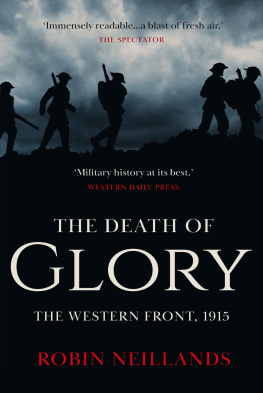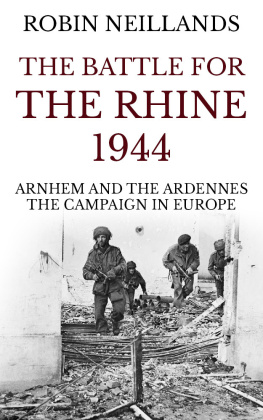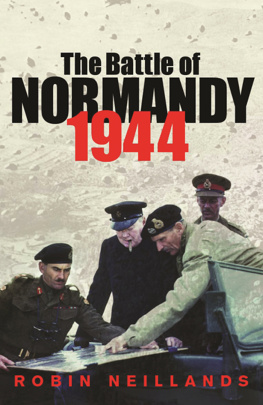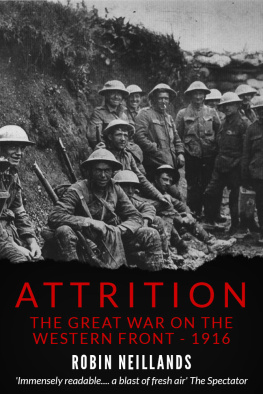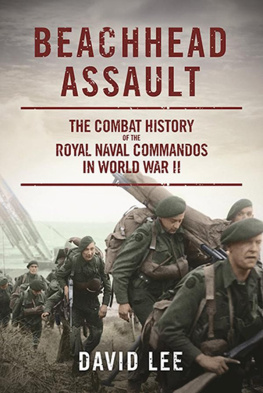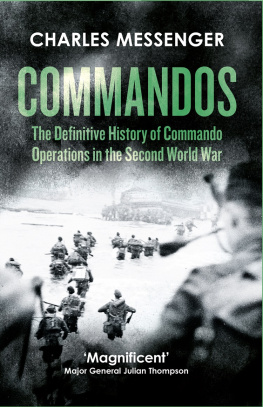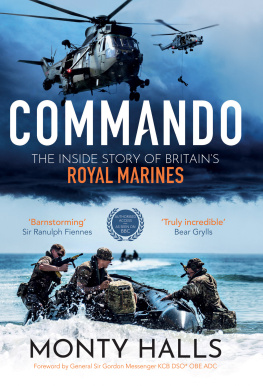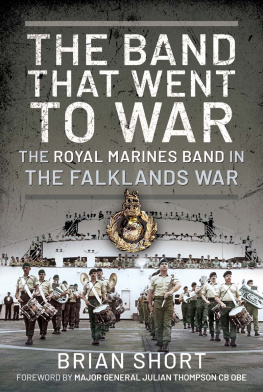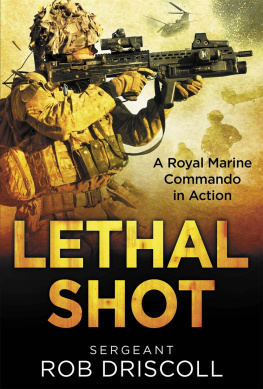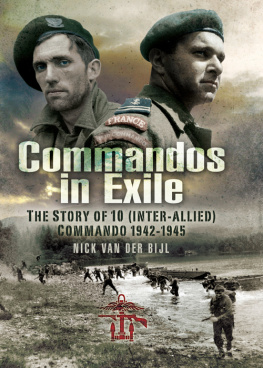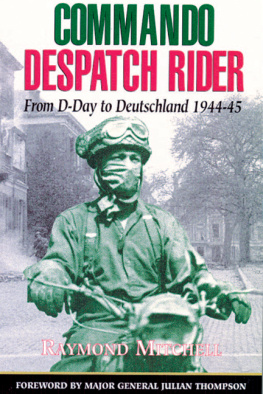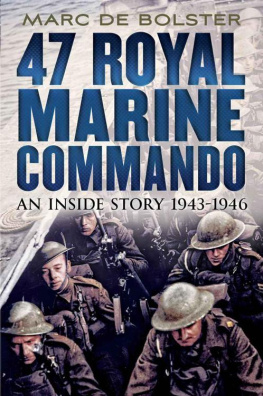By Sea and Land
Robin Neillands is a well-known writer and journalist, a frequent contributor to national newspapers and magazines and the author of over forty books on travel, history and the great outdoors, including those on such exploits as riding his bicycle across Arabia and walking across France from the Channel to the Mediterranean. In recent years he has turned to writing fiction, and his first two novels, The Fourth Angel and Quarrys Contract have attracted considerable acclaim both in Britain and abroad.
He served in the Royal Marines, in S Troop of 45 Commando. He now lives in Buckinghamshire and Spain.
Major-General Julian Thompson, CB, OBE, has recently retired after a long and successful career in the Royal Marines, a service spent entirely with the Commando Units, moving from second-lieutenant to command 3 Commando Brigade, Royal Marines, during the war in the South Atlantic. Since leaving the Corps, he has turned to writing and his first book on 3 Commando Brigade in the Falklands, No Picnic (also published by Fontana), enjoyed considerable success.
Also by Robin Neillands
Military History
Eighth Army: From the Western Desert to the Alps, 194045
The Bomber War: Arthur Harris and the Allied Bomber Offensive
The Battle of Normandy, 1944
Attrition: The War on the Western Front, 1916
The Great War Generals on the Western Front
A Fighting Retreat; The British Empire, 19471997
In the Combat Zone; Special Forces since 1945
The Raiders: The Army Commandos, 19401945
D-Day, 1944:Voices from Normandy (with Roderick de Normann)
The Conquest of the Reich, 1945
Wellington and Napoleon; Clash of Arms, 18071815
The Dervish Wars; Gordon and Kitchener in the Sudan
The Desert Rats; 7th Armoured Division, 19401945
The Hundred Years War
The Wars of the Roses
Travel
The Road to Compostela
Walking through France
Walking through Spain
Walking through Ireland
Walking through Scotland
The Travelling Historians Guide to France
Biography
Ulysses S. Grant; A Great Commander
Winston S. Churchill; Man of the Century
Robin Neillands
BY SEA AND LAND
The Story of
the Royal Marines Commandos
This book is dedicated to
CH/X 4316 Sergeant J. N. Routledge,
40 Commando, Royal Marines,
who died of his wounds in Cyprus on
19 December 1955
They received, each for his own memory, praise
that will never die, and with it the grandest
of all sepulchres; not that in which their
mortal bones are laid, but a home in the minds
of men, where their glory remains fresh
Pericles
First published in Great Britain by
George Weidenfeld & Nicolson Ltd in 1987
Published in 2004, in this format, by
P E N & S W O R D M I L I T A R Y C L A S S I C S
an imprint of
Pen & Sword Books Limited
47 Church Street
Barnsley
S. Yorkshire
S70 2AS
Copyright Robin Neillands, 1987, 2004
ISBN 1 84415 043 7
A CIP record for this book
is available from the British Library.
Printed in England by
CPI UK
Introduction to Second Edition
It is some measure of success when a writer reviews a book written some time ago and decides that, on balance, and with the exception of a few misspellings, he does not want, or need, to change a word of it. The views and statements made then have stood the test of time. The Royal Marines are the finest fighting Corps in the world, and if the Corps is small and the Commando element even smaller, well, you dont find diamonds as big as house bricks.
In this edition I have taken the opportunity to tidy the text up a bit and add a new chapter carrying the Royal Marines Commando story forward another 20 years, from the South Atlantic in 1982 to Iraq in 2003. This has been both a labour of love and a great test of patience for one of the less happy developments in the military world in recent years has been the growth of acronyms; to update the book it has been necessary to wade through such abbreviations as COMUKAMPHIGFOR, COMUKNLPHIBGRU, UKLF, CSG, POTL, LCU, NTG, and a hundred more, all more or less mystifiying to an old bootneck, while enduring, and avoiding for the readers sake, such painful, post- modern constructs as deconfliction and asymmetric?
Well, plus ca change; I am sure that in my day, many years ago, we also had a fair amount of jargon. The basics remain and the Corps soldiers on, taking its fair share or a little more than its share of any action that is going in this uncertain world. This is the story of the Royal Marines Commandos in the first 60 years of their existence; who can tell what the future will bring but good luck to them, whatever or wherever it is.
Robin Neillands,
Marlborough, Wilts, 2004.
FOREWORD BY
Major-General Julian Thompson, CB, OBE
Although there have been a number of books written about the Royal Marines Commandos, or books with substantial sections about them included in the text, a fuller account of their deeds both in action and in more relaxed moments has long been overdue. Rob Neillands, who served in 45 Commando, has recognized this and, perhaps more important, seen the need to collect stories from the men who served in the Commandos during the Second World War before memories fade, or the old Commando soldiers die.
The formation of the Royal Marines Commandos in 1942 came at a critical period in Royal Marines history; the Royal Marines Division was kicking its heels in England, having taken part in only one operation since its formation in 1939. It appeared that nobody wanted it and Rob Neillands explains why. The Royal Marines role at sea, in cruisers, battleships and carriers was an anachronism and had been so since the late nineteenth century. This is no slur on their loyal and courageous service with the Fleet, but their employment in jobs that could just as well be done by others, was the result of a total lack of any amphibious doctrine in the Royal Navy, so much so that the greatest fleet the world had ever seen (until the emergence of the US Navy in the Second World War) had no amphibious capability and consequently no ability to project their power ashore, and apparently did not want to, perhaps because of strategic and tactical myopia in failing to understand that navies can lose wars but cannot win them. Wars are won by men seizing and holding ground, and if this has to be done from the sea, it is best done by men who are trained and equipped for this specialized amphibious role.
The birth of the Royal Marines Commandos was not without its problems, with detractors both inside and outside the Corps of Royal Marines. The critics outside, the Army Commandos, jibed that the Royal Marines Commandos were not volunteers and were attempting to usurp a role created by the Army Commandos. On both counts these were pretty spurious charges. Although Royal Marines battalions were converted directly into commandos, the unfit were weeded out and the fainthearted voted with their feet, requesting a transfer to a less demanding assignment. There is an interesting analogy here with the splendid parachute battalions of 6 Airborne Division in the Second World War, who were raised in the same way from infantry battalions, and were able to carry their battalion


